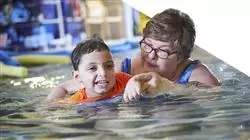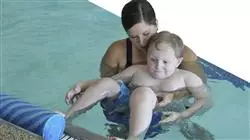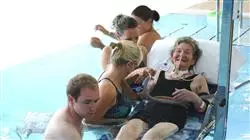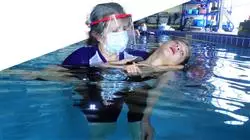University certificate
The world's largest faculty of physiotherapy”
Why study at TECH?
Become an expert in Aquatic Physiotherapy for Special Populations in just 12 months”

Hydrotherapy is a technique that has been used for many years in the treatment of different pathologies. Notable advances include shock wave therapy, flotation, jet therapy and warm water therapy. This field is joined by technological advances and the emergence of new aids, which allow physiotherapists to address cases that were previously difficult to treat.
In this way, Aquatic Physical Therapy has become a fundamental tool in the treatment of Special Populations, especially for the prevention of injuries in people with physical disabilities, pregnant women and older adults who require recovery from surgery. Given its relevance, TECH has decided to design this university degree that perfectly combines the most advanced theoretical framework and 100% online with a practical stay in a first class clinical environment.
This is a unique opportunity for updating, through a program designed to respond to the real needs of specialists and in only 12 months. In this way, you will be up to date on the most advanced techniques for the approach to various pathologies in neurological patients and patients with special characteristics, advances in hygiene and safety protocols or the control and monitoring of the patient in their recovery process.
In addition, this academic option offers innovative didactic material and the Relearning pedagogical method, which allows to reduce study hours and maximize the updating of knowledge. As a culmination of this academic experience, the professional will carry out a practical stay in a specialized clinical center, where they will be guided by the best experts in Aquatic Physiotherapy. An essential phase to integrate all the procedures addressed in the theoretical framework, as well as to incorporate the working methodologies of the best experts.
In this way, the physiotherapeutic professional will be able to take part in a unique academic option offered only by TECH, the largest digital university in the world.
Make the most of this opportunity to surround yourself with expert professionals and learn from their work methodology”
This Hybrid professional master’s degree in Aquatic Physiotherapy for Special Populations contains the most complete and up-to-date scientific program on the market. The most important features include:
- Development of more than 100 cases presented by physiotherapy professionals who are experts in addressing pathologies in Special Populations
- The graphic, schematic, and practical contents with which they are created, provide scientific and practical information on the disciplines that are essential for professional practice
- Patient assessment and integration of the latest recommendations for successful integration of Therapeutic Swimming
- Comprehensive systematized action plans for the main pathologies in the Intensive Care Medicine Unit
- Presentation of practical workshops on procedures, diagnosis, and treatment techniques in critical patients
- An algorithm-based interactive learning system for decision-making in the clinical situations presented throughout the course
- Approach to the different injuries according to the characteristics of the population
- With a special emphasis on evidence-based medicine and research methodologies in sports recovery of. lesions
- All this will be complemented by theoretical lessons, questions to the expert, debate forums on controversial topics, and individual reflection assignments
- Content that is accessible from any fixed or portable device with an Internet connection
- Furthermore, you will be able to carry out a clinical internship in one of the best clinical and centers
Up to date your knowledge in Aquatic Physiotherapy and apply it in a prestigious clinical center with our 3-week practical stay”
In this proposal for a Master's Degree, of a professionalizing nature and blended learning modality, the program is aimed at updating physiotherapists who perform their functions in clinical centers and hospitals, and who require a high level of qualification. The contents are based on the latest scientific evidence, and oriented in a didactic way to integrate theoretical knowledge in physiotherapist practice, and the theoretical-practical elements will facilitate the updating of knowledge and will allow decision making in patient management.
Thanks to their multimedia content developed with the latest educational technology, they will allow the physiotherapy professional to obtain situated and contextual learning, i.e. a simulated environment that will provide immersive learning programmed to train in real situations. This program is designed around Problem-Based Learning, whereby the physician must try to solve the different professional practice situations that arise during the course. For this purpose, the students will be assisted by an innovative interactive video system created by renowned and experienced experts.
This Hybrid professional master’s degree will take you to deepen in the scientific evidence on the approach to the neurological patient in the aquatic environment"

Boost your skills to develop therapeutic swimming programs through this university degree"
Teaching Planning
This academic option offers a comprehensive and high quality curriculum that combines theory and practice in equal measure. Professionals will have access to the best specialists in the field of Aquatic Physical Therapy for Special Populations, which will allow them to enhance advanced skills and innovative treatment techniques. In addition, the practical stay in a distinguished clinical center will provide them with an unparalleled experience to apply what they have learned in a real environment and under supervision. All of this, in addition to innovative multimedia content that can accessed 24 hours a day , from any device Digital with an Internet connection.

The innovative didactic material and the Relearning method will allow you to maximize your updating process in Aquatic Physiotherapy for Special Populations and reduce the hours of study”
Module 1. Properties
1.1. Situation
1.2. Chemical Properties
1.2.1. Drinking Water
1.2.2. Thalassotherapy
1.2.3. Medicinal Mineral Water
1.2.4. Thermal Waters
1.3. Thermal Properties
1.3.1. Temperature Indifferent
1.3.2. Thermo Hydrotherapy
1.3.3. Cryo Hydrotherapy
1.3.4. Contrasts
1.4. Activities and Temperature
1.5. Physical Properties
1.5.1. Hydrostatics
1.5.2. Hydrodynamics
1.6. Physiological Effects Caused by Immersion
1.6.1. Respiratory System
1.6.2. Cardiovascular System
1.6.3. Renal System
1.6.4. Nervous system
1.6.5. Neuro-musculoskeletal System
1.7. Indications
1.8. Relative Contra-indications
1.9. Absolute Contra-indications
1.10. Centers
Module 2. Aquatic physiotherapy
2.1. Definition
2.2. Installation Assessment
2.2.1. Accessible
2.2.2. Depth
2.2.3. Installation Accessories/Typologies
2.2.4. Fall Hazards
2.3. Patient Assessment
2.3.1. Patient Characteristics
2.3.2. Mastery/Control of the Medium
2.3.3. Keys to Safe Practice
2.4. Material
2.4.1. Floating
2.4.2. Resistance
2.4.3. Alternative
2.5. Session Structure
2.5.1. Principles of Training
2.5.2. Session Approach
2.6. Halliwick WST
2.7. Bad ragaz
2.8. Ai chi
2.9. Watsu
2.10. Other Work Methodologies
Module 3. Hydrotherapy Techniques
3.1. Wellness Concept
3.2. Bathrooms
3.3. Water-Jets
3.4. Showers
3.5. Small Hydrotherapy
3.5.1. Wraps
3.5.2. Compresses
3.5.3. Promotions
3.5.4. Ablutions
3.5.5. Affusions
3.6. Hydrotherapy by respiratory route
3.7. Other Techniques
3.8. Applications
3.9. Circuits
3.9.1. Spa Centers
3.9.2. Saunas
3.10. Latest Trends
Module 4. Approach to Upper and Lower Extremity Pathology
4.1. Amplitude of Motion (AMD)
4.1.1. Activate
4.1.2. Passive
4.2. Strength
4.3. Proprioception
4.4. Central Stability
4.5. Applicability/Transferability of the Gesture
4.6. Closed and Open Kinetic Chain
4.6.1. Stability-instability
4.6.2. Concentric and Eccentric Work
4.6.3. Depth and Progression
4.7. Relevant Aspects of Aquatic Physiotherapy Treatment
4.7.1. Pre-session Considerations
4.8. Work Progression
4.8.1. Phases
4.8.2. Difficulty
4.9. Structure of the Upper Extremity Session
4.9.1. Work Objectives
4.10. Structure of the Lower Extremity Session
4.10.1. Work Objectives
Module 5. Pregnant and Aquatic Environment
5.1. Characteristics of the Pregnant Woman
5.1.1. Morfoligical
5.1.2. Physiology
5.1.3. Psychology
5.2. Physical Activity and Pregnancy
5.2.1. Benefits of Physical Activity
5.2.2. Indications for Physical Activity
5.2.3. Contraindications to Physical Activity
5.3. Indications for the Aquatic Physiotherapy Session
5.3.1. General Recommendations for Starting Aquatic Physical Therapy
5.4. Work Objectives for Pregnant Women in the Aquatic Environment
5.5. Structure of the Session for Pregnant Women in the Aquatic Environment
5.6. Contraindications to Aquatic Physiotherapy
5.6.1. Revaluation
5.7. Warning Signs
5.8. Characteristics of Post-Partum
5.8.1. Morfoligical
5.8.2. Physiology
5.8.3. Psychology
5.9. Indications for Post-Partum Aquatic Physiotherapy Session
5.10. Structure of the Post-Partum Aquatic Physiotherapy Session
5.10.1. Work Objectives
Module 6. Approach to the Pediatric Patient in the Aquatic Environment
6.1. Child Development
6.1.1. Evolutionary Stages
6.2. Benefits of Aquatic Physiotherapy in Children
6.2.1. Early Stimulation
6.3. In-Water Communication
6.3.1. Verbal Communication
6.3.2. Non-Verbal Communication
6.4. Fear of Water
6.4.1. Familiarization with the Aquatic Environment
6.4.2. Mastery of the Medium
6.5. The Family and the Aquatic Environment
6.5.1. Integration of the Family Unit
6.6. Aquatic Game
6.6.1. Classification
6.6.2. Advantages of the Use of the Aquatic Game
6.7. The Motor Story
6.8. Indications for the Aquatic Physiotherapy Session
6.8.1. General Recommendations for Starting Aquatic Physical Therapy
6.9. Session Structure
6.9.1. Parts of the Session
6.9.2. Work Objectives
6.10. Water as a Sensory Medium
Module 7. Approach to the neurological patient in the aquatic environment
7.1. Benefits of Aquatic Physiotherapy in the Neurological Patient
7.1.1. Advantages of the Use of the Aquatic Environment
7.1.2. Patient Assessment
7.2. AVC
7.3. EM
7.4. Parkinson’s Disease
7.5. Other Pathologies
7.6. The ICF
7.6.1. Definition
7.6.2. Motor Aspects
7.6.3. Perceptual Aspects
7.6.4. Cognitive Aspects
7.6.5. Participation
7.7. The Interdisciplinary Team
7.7.1. Joint Risk-Benefit Assessment
7.7.2. Professionals Interacting in the Session
7.8. Re-education of Gait and Activities of Daily Living
7.8.1. Phases of the March
7.8.2. Anticipatory Postural Adjustments (APA)
7.8.3. Circuits
7.8.4. Translation
7.9. Indications for the Aquatic Physiotherapy Session
7.9.1. General Recommendations for Starting Aquatic Physical Therapy
7.10. Session Structure
7.10.1. Work Objectives
7.10.2. Parts of the Session
Module 8. Therapeutic Swimming
8.1. Definition
8.1.1. Aquatic Programs
8.1.2. Benefits of Working in the Aquatic Environment
8.2. Basic Aquatic Motor Skills
8.3. Prevention
8.3.1. Style Assessment
8.3.2. Postural Control and Awareness Work
8.4. Spine Work Objectives in the Aquatic Environment
8.5. General Spinal Work
8.5.1. Aspects to take into account
8.6. Structure of the Therapeutic Swimming Session
8.6.1. Work Objectives
8.6.2. Periodicity
8.7. Cervicodorsal Component
8.7.1. Aspects to take into account
8.7.2. Practical Examples
8.8. Lumbar Component
8.8.1. Aspects to take into account
8.9. Postural Scoliosis
8.9.1. Aspects to take into account
8.10. Structural Scoliosis
8.10.1. Aspects to take into account
Module 9. Approach to specific groups in the aquatic environment
9.1. Benefits of Aquatic Physiotherapy in Oncology Treatment
9.1.1. Relevant Aspects in the Design of Treatment in the Aquatic Environment
9.2. Structure of the Aquatic Physiotherapy Session for the Oncology Patient
9.3. Advantages of Aquatic Physiotherapy in Fibromyalgia
9.3.1. Relevant Aspects in the Design of Treatment in the Aquatic Environment
9.4. Structure of the Aquatic Physiotherapy Session in the Fibromyalgia Patient
9.5. Benefits of Aquatic Work in the Population with Cognitive Degenerative Disorders
9.5.1. Relevant Aspects in the Design of Treatment in the Aquatic Environment
9.6. Structure of the Aquatic Physical Therapy Session for Population with Cognitive Degeneration
9.7. Socialization in the Aquatic Environment of the Patient with Cognitive Degeneration
9.8. Aquatic Physiotherapy in Performance
9.8.1. Phases of Recovery from Injuries in the Aquatic Environment
9.9. Invisible Training and Post-Exertion Recovery
9.10. Injury Prevention
Module 10. Safety and Hygiene
10.1. Installation Safety Measures
10.1.1. Accessible
10.1.2. Changing Rooms
10.1.3. Occupancy
10.2. Vessel Safety Measures
10.2.1. Accessible
10.2.2. Components
10.2.3. Occupancy
10.3. Quality Control of Water
10.3.1. Water Quality
10.3.2. Air Quality
10.3.3. Infection Control
10.4. The Lifeguard
10.5. Patient Security
10.6. Physical Therapist Safety
10.7. Emergency Plans and Protocols
10.8. Occupational Hazards
10.9. Legislation
10.10. News about covid-19

Develop skills to treat sports injuries and improve recovery after surgery with this unique program in the academic landscape”
Hybrid Professional Master's Degree in Aquatic Physiotherapy for Special Populations
Aquatic physiotherapy is a therapeutic technique that uses water as a medium to carry out exercises and treatments. Thanks to the properties of water, exercises can be performed with less impact on the joints and greater freedom of movement. In addition, water provides a relaxing effect and stimulates blood circulation, which facilitates recovery from injuries and ailments.
TECH Global University offers the Hybrid Professional Master's Degree in Aquatic Physiotherapy for Special Populations, which aims to train physiotherapy professionals in the application of this technique in special populations, such as people with disabilities, the elderly, pregnant women and patients with chronic diseases.
Students will have the opportunity to learn online from experts in aquatic physiotherapy and will be able to apply the knowledge acquired in practical cases with real patients.
The Hybrid Professional Master's Degree program includes topics such as hydrotherapy, aquatic rehabilitation, care for patients with disabilities, injury prevention and teamwork. Students will also have the possibility to specialize in one of the areas of aquatic physical therapy and develop a final research project.
The Hybrid Professional Master's Degree in Aquatic Physical Therapy for Special Populations of TECH Global University is aimed at physical therapists who wish to expand their knowledge in this therapeutic technique and specialize in its application in special populations. Students will be able to access quality training and at the forefront of the latest techniques and advances in aquatic physiotherapy.







